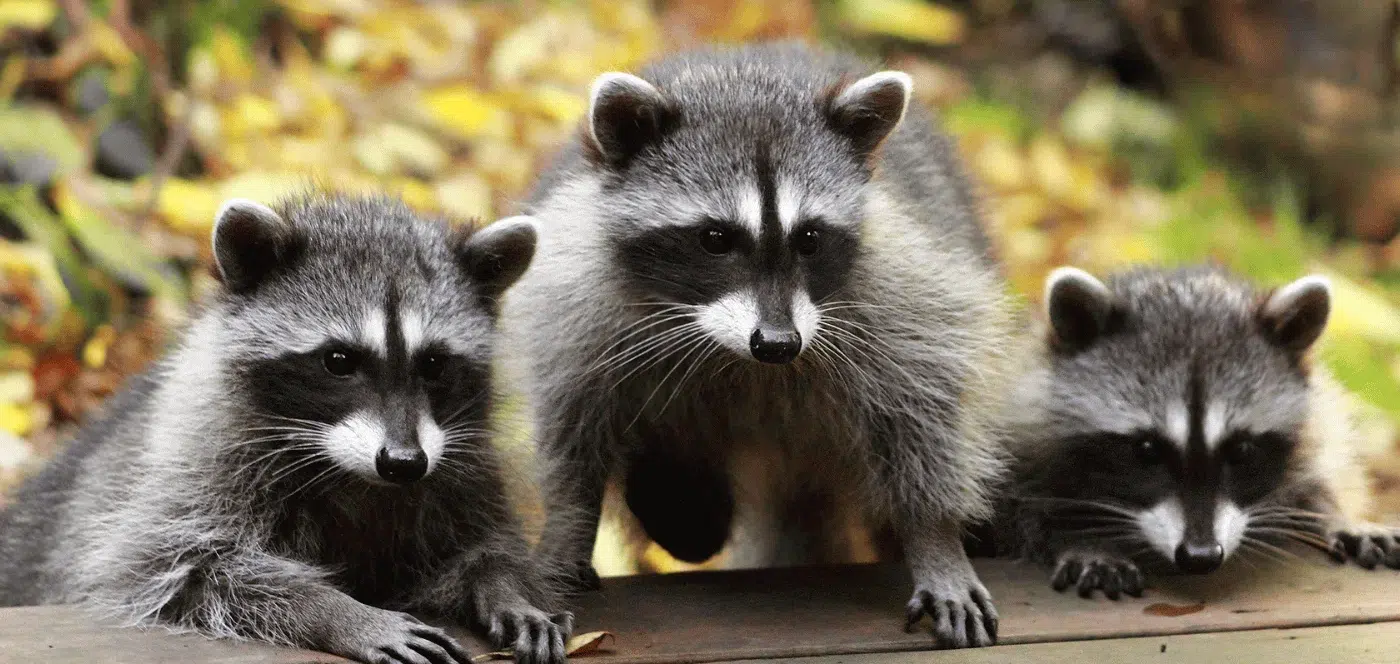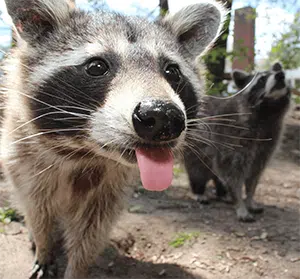It is February and raccoons are starting to mosey out 'n about - in fact, one Hawkeye team member encountered one in a building that houses her chicken coop, just this past weekend. They are getting ready for mating and breeding season. Let's have a closer look at the lifecycle of raccoons.

Raccoon Mating and Breeding
In the late stages of winter and up until early spring, able bodied raccoons partake in mating rituals which culminate in females breeding with mostly just one male, and males breeding with as many females as possible. Yearling females often reach sexual maturity in their first mating season, while many boys develop a bit slower and may have to sit that first year out.
Mating Rituals
 In the arena of Raccoon Mating, healthy, strong, young and older males will posture and compete for the right to mate - up to and including duking it out amongst each other and in front of the ladies. They'll scratch, bite, and even throw each other around while eligible females observe the spectacle and choose their champion accordingly. Communications between males and females include vocalizations, such as chirps and whistles, as well as physical contact in the form of the females arching their back and rubbing against the chosen male to express approval and interest in breeding. The chosen dominant, strong and healthy male may become several ladies' champion and breed with several females. Since the victor, or champion, cannot possibly impregnate all available females, even lower ranked males will eventually get the chance to mate.
In the arena of Raccoon Mating, healthy, strong, young and older males will posture and compete for the right to mate - up to and including duking it out amongst each other and in front of the ladies. They'll scratch, bite, and even throw each other around while eligible females observe the spectacle and choose their champion accordingly. Communications between males and females include vocalizations, such as chirps and whistles, as well as physical contact in the form of the females arching their back and rubbing against the chosen male to express approval and interest in breeding. The chosen dominant, strong and healthy male may become several ladies' champion and breed with several females. Since the victor, or champion, cannot possibly impregnate all available females, even lower ranked males will eventually get the chance to mate.
Raccoon Breeding
Female raccoons have a very short window of fertility, only three to four days per mating season - so, much mating takes place during those few days. The actual mating or breeding involves an hour or so of foreplay and culminates in copulation. After a brief pause to recover they go on to repeat. Yeah, it's a busy couple of days! After all that mating is done and over with, the couple may stay together for a few days but the male will move on and leave the now expectant mum to fend for herself and her offspring.
Gestation and Birth
Mum-to-be must now spring into action and procure a suitable den to give birth to her litter of kids in about 2 months time. This is also the time where she will be most inclined to rip up a roof shingle or two to get access to cozy places like attics and where you'll need to pay extra attention or get in touch with a wildlife removal company. She will birth anywhere from one to seven raccoon babies, with the average litter containing four kits. The babies are born blind, deaf and hairless, weighing only about 4 to 5 ounces. The only thing giving away the impression that these are in fact raccoons, are the tiny little masks already visible. As they are completely helpless, they are solely depending on their mother's care for their first 3 weeks of life. Sadly, somewhere around 50% of newborns will not survive their first year.
Life in the Den
Although momma raccoon will take the wee ones to the outside world for little excursions once their eyes open around 4 weeks, the kits will stay in the den for the next 6-8 weeks, with their mum looking after their every need.
A Raccoon's First Year of Life
Around three months of age, baby raccoons are weaned and introduced to the world in earnest. They will shadow their mother and learn about finding food and survival in general. All raccoons are intelligent and curious, and young raccoons have been seen playing and rough housing and performing fun acrobatic maneuvers.
The First Winter
By the time fall arrives,, the wee ones have grown into independent, adventurous, and resilient youngsters., It is not uncommon, though, for them to spend their first winter denning with their mother and siblings, especially in colder climates. As with many other things, there is strength in numbers and more bodies can create and retain more heat.
Setting Out on their Own
Almost a year has passed and a new mating season is on the horizon. Young females may or may not be ready to reproduce and will likely stick close to their birth place, while their brothers will often move into territories that are 20km or more away. These young males are likely not yet ready to breed and will use the upcoming year to establish themselves in their new territory. Researchers believe that traveling this fairly long distance in search of a new home range is instinctive behavior to avoid or reduce the chance of inbreeding. We have now come full circle.
Life Span of a Raccoon
We've stuck with our little raccoon family for the first year - but now what? Are they going to go on and live long and happy lives? Sadly, probably not.
How Long do Raccoons Live?
In the wild (and that includes the Urban Jungle), as many as half of all juveniles perish in the first year. That said, once matured, and if there is an abundance of food, no predators, and no humans with automobiles and such, a life span of ten years is quite possible. Predation, loss of habitat, and misadventures with humans are the main causes of premature raccoon death. Of course, then there are common diseases, too:
- Rabies
- Canine distemper (also known as footpad disease)
- Raccoon parvoviral enteritis
- Leptospirosis
- Infectious Canine Hepatitis (ICH)
- Pseudorabies
Raccoons in Captivity
Pampered and in captivity, raccoons have been recorded to live as long as twenty-two years. Although, most 'pet' raccoons won't live longer than ten years, either.
The Trouble with Raccoons in Urban Settings
Whether you're an animal lover or not, whether you are enchanted by the clever raccoon's antics or not - raccoons do not belong in or around human housing developments. For their sake as well as ours. No animal is meant to raid trash cans for left over french fries or hot dogs. Whether humans are meant to eat such things, is questionable as well. And no home owner will appreciate the damage, cost, and anxiety caused by a raccoon breaking into his or her attic. If you are experiencing uninvited raccoons in your home or business, contact Hawkeye Bird & Animal Control today. We are the foremost Raccoon Removal Experts in the Toronto area - take advantage of our 30+ years of experience with removing raccoons.














